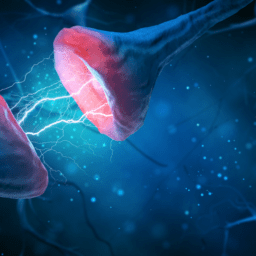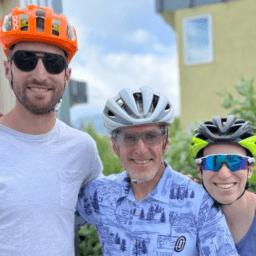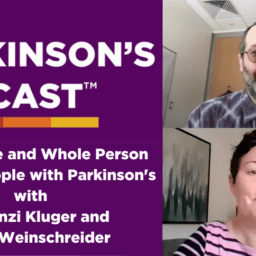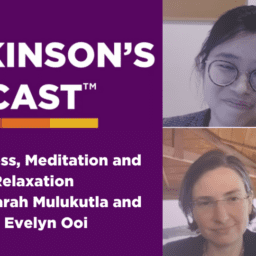Some quotations in this post have been edited for length and clarity.
Our February Care Partner Meetup featured our regular panel: Foundation co-founder Connie Carpenter Phinney, Foundation ambassadors Gail Gitin and Pat Donahoo, and our moderator and the Foundation’s Executive Director, Polly Dawkins. We were also pleased to have a special guest: Dr. Mark Mapstone, who is a neuropsychologist at University of California, Irvine.
Watch the video of this month’s meetup below, and sign up to join us live for future meetups.
We also have an audio version of this webinar.
NOTES
Written by Connie Carpenter Phinney
NEUROPSYCHOLOGY AND OUR WONDERFUL BRAIN
Neuropsychologists focus on the relationships between the physical structures of the brain and how these relationships produce all the emergent properties of the brain. These properties, Dr. Mapstone said, include “the way that we feel emotions, the way that we can think and plan, the way that we can remember, things that happen in the past and the way that we can forecast things that are going to happen in the future.”
Dr. Mapstone noted that he mostly works in a clinical setting, which means he works with his patients–including people with Parkinson’s–to understand behaviors and form strategies to live well with Parkinson’s.
MILD COGNITIVE IMPAIRMENT, PARKINSON’S DISEASE DEMENTIA, AND PARKINSON’S DISEASE PSYCHOSIS
To establish a common understanding of some common concerns neuropsychologists treat, we asked Dr. Mapstone to define mild cognitive impairment (MCI), Parkinson’s disease dementia (PDD), and Parkinson’s disease psychosis (PDP).
Dr. Mapstone described dementia as a constellation of cognitive symptoms representing a change in cognitive function or behavior. He said changes related to dementia represent “a decline from some previous ability, and that it impacts your daily functional abilities.” An essential part of any dementia is that it has an impact. He explained, “If you’re having a change in thinking or behavior and it really doesn’t impact you, then it does not quite meet the definition of dementia.”
PDD is one form (or cause) of a dementia. Alzheimer’s disease is another form or a cause of dementia. Chronic traumatic encephalopathy is still another form of a dementia. There are many different ways you can get dementia; Parkinson’s disease dementia is just one of them.
In contrast to PDD, MCI is when there is a change in cognition that can be seen on tests of thinking or memory but which does not impact your daily functional capacities. Dr. Mapstone said, “Many people with MCI will go on to develop a dementia syndrome as the cognitive changes progress significantly enough to impact functional activities.”
While MCI doesn’t impact activities, Dr. Mapstone stressed that “MCI is not normal aging, and it can be measured on tests.” When we asked if a person could hide MCI, he explained, “By the time someone shows up in my office for an evaluation, both the patient and the care partner are noticing things that are quite obvious.”
In defining PDP, Dr. Mapstone said, “Parkinson’s psychosis is really a disorder of thinking characterized by abnormal thoughts or behaviors, delusions [or] thoughts in which you think something’s happening, or you misperceive or misinterpret the reasons for why things are happening.” A person experiencing PDP might think, for example, that their spouse is cheating on them or robbing them.
Sometimes, PDP impacts visual or auditory function. Dr. Mapstone said, “Your person with Parkinson’s might see things that aren’t real. They might tell you there are children or small animals in the house, or that they saw something in the front yard when something is obviously not there.” While auditory hallucinations are less common for people with Parkinson’s than visual hallucinations, Dr. Mapstone also said that a person with PDP might hear voices or people speaking to them.
It is important for care partners to know that certain medications—most notably dopamine agonists—can precipitate and cause these hallucinations. Dr. Mapstone advised that you tell your doctor about if your person with Parkinson’s is reporting hallucinations.
BASELINE TESTING
Because neuropsychological changes associated with Parkinson’s are changes from normal functioning, Dr. Mapstone advised to schedule a baseline appointment “as early as possible.” Even if you haven’t noticed any cognitive issues, a baseline visit can be helpful. Down the line, the cognitive evaluation a neuropsychologist provides may provide useful data to help understand the degree of change your person has experienced. Dr. Mapstone added, “Getting this assessment early and building a relationship with a neuropsychologist will help you as the disease progresses.”
Dr. Mapstone says he almost demands that care partners attend visits with their person with Parkinson’s. He says he considers himself to be providing treatment for both partners, and that “the strength of one is going to support the strength of the other.”
REFERRALS To a NEUROPSYCHOLOGIST
A real barrier to getting proper neuropsychological care for your person is the shortage of trained neuropsychologists. There are fewer than 10,000 in the United States, and many of these providers are not directly affiliated with movement disorder centers. Dr. Mapstone advised that this is not necessarily a problem: A clinical neuropsychologist does not need to be specialized in movement disorders to perform an assessment and help someone living with Parkinson’s.
Still, caregivers must be vocal to get access to this kind of care because it’s not routinely provided. Dr. Mapstone said most people he treats are referred to him by a neurologist or movement disorder specialist.
WHAT TO DO WHEN YOUR PERSON WITH PARKINSON’S IS UNCOOPERATIVE
Gail offered the observation that “those of us who have been in the trenches for many years know a lot of the behavior that we’re dealing with is hard. How can we balance our response to the person with Parkinson’s when he is exhibiting behavior that is frustrating in so many ways? Apathy is a huge one, or not wanting to tell family members so that you can get some support, not wanting you to go with them to the doctor’s offices.”
Dr. Mapstone echoed the sentiment and reminded us all to keep in mind that the disease changes your person with Parkinson’s in both subtle and more obvious ways. People with Parkinson’s are not all the same, and Dr. Mapstone advised us that the first thing is to recognize that the practical and relationship difficulties you face as a care partner are often caused by changes in the brain due to Parkinson’s. He said, “I just want to emphasize the point that the person your person with Parkinson’s is doing the best that they can with the hand they’ve been dealt.”
Dr. Mapstone also encouraged us to continue to educate ourselves about Parkinson’s. Becoming more informed about Parkinson’s can help you make the jump from being angry or frustrated with your person to understanding they are not purposefully behaving in a problematic way.
WAYS TO SLOW COGNITIVE DECLINE
EXERCISE
There is much evidence supporting exercise’s benefits to the brain. Dr. Mapstone said one way exercise helps is by improving cardiovascular function. This brings more oxygen to the brain and improves overall brain health. We can encourage exercise together and apart. Make sure you take time for you but if you enjoy boxing class or a spin class together, do it!
NEW AND CHALLENGING ACTIVITIES
Dr. Mapstone said, “The brain really likes to be stimulated […] The brain doesn’t like inactivity at the at the baseline state. The cells in your brain are neurons principally, and they like to talk to each other. And the more neighbors that a neuron can talk to the healthier your brain is, it creates these connections called synapses, and the more synapses you have [makes] the brain more resilient.”
Dr. Mapstone used the analogy of your brain being like a rainforest filled with trees. The more trees you have the more you can withstand when one of the trees falls.
PUZZLES
Dr. Mapstone was asked specifically about puzzles for brain health, including sudoku and jigsaw puzzles. He said the important thing is to make sure the things you do to support brain health are challenging, enjoyable, and new to you.
NOVELS AND AUDIOBOOKS
Reading complex novels is an example of a challenging, enjoyable, and new experience since it pushes your brain to become familiar with a new set of characters, locations, and problems.
Dr. Mapstone noted that if you’re really paying attention, audiobooks can be helpful, just like reading. He reiterated the need for challenge, though: “Doing things that are easy won’t hurt you, but they may not be enough stimulation to help you improve.”
MEDICINES AND OTHER “COGNITIVE ENHANCERS”
Dr. Mapstone says, “While some medications are useful in Alzheimer’s, they are not likely to be effective for someone with Parkinson’s.
As for “cognitive enhancers,” also known as nootropics, he said, “We don’t have good evidence they do what they are supposed to do. So. I’m not saying stay away from [them], but I have yet to be convinced that there are real cognitive enhancers that can be useful.”
DON’T FORGET YOUR OWN NEEDS
Gail says she hears from so many care partners who feel like they are losing it themselves because the process can be so daunting. What can you, the care partner, do? It’s important to consider therapy for yourself, or to arrange respite care or schedule times when you can do things you love to do on your own to help you recharge.
Gail also talked about the burden of the care partner and how they must decide how much of their own energy they can put into their person with Parkinson’s schedule. She recommended that care partners recruit family and friends to help, and that care partners learn to delegate.
I added that leaning into is forgiveness can be very helpful, including self-forgiveness and maybe forgiveness for your person with Parkinson’s in situations when they have not behaved gracefully.
WRAPPING UP: A QUESTION OF OPTIMISM
We ended with a question about hope and reality or the balance between being optimistic. I asked, “Is it a fault to be too optimistic?”
Dr. Mapstone replied, “A good dose of optimism is really important. You know, without hope, what else do we have?” He added, “You want to make sure every day is the best you can be, and know there are going to be days that you’re not your best. There will be days when your partner is not the best, and you have got to take those and move past it. It’s in the past. Hope is important.”
On that note, we hope you’ll join us for our next Care Partner Meetup, which will be March 5, 2024. After two months in a row with special guests, we plan to focus on your questions, so please share them with us by emailing [email protected].
ADDITIONAL RESOURCES
Other Content Featuring Dr. Mapstone
Davis Phinney Foundation Apathy Archives
 WANT MORE PRACTICAL ARTICLES LIKE THIS?
WANT MORE PRACTICAL ARTICLES LIKE THIS?
You can learn much more about living well with Parkinson’s today through our Every Victory Counts® suite of resources. Each manual is packed with up-to-date information about everything Parkinson’s. Click the link below to reserve your manual(s).
Thank you to our 2024 Gold Partner, AbbVie, and our Silver Partner, Mitsubishi Tanabe Pharma America, for their ongoing support of these must-have manuals. Additionally, we’d like to thank Barbara and Dale Ankenman, Abby and Ken Dawkins, Bonnie Gibbons, Irwin Narter, Lorraine and J Wilson, and Gail Gitin in loving memory of Gene Gitin for their generous donations that allow us to make these resources available and accessible to all.

















